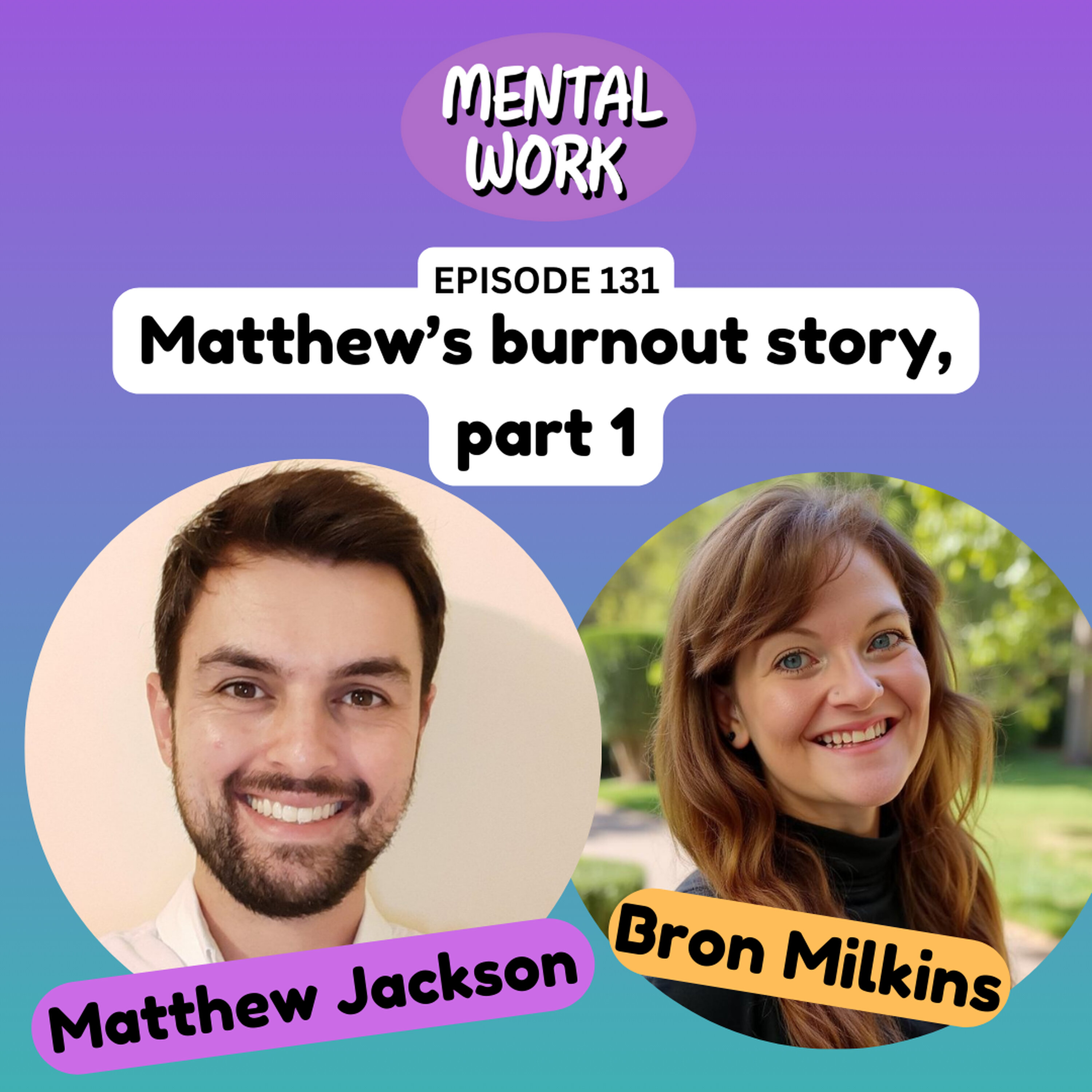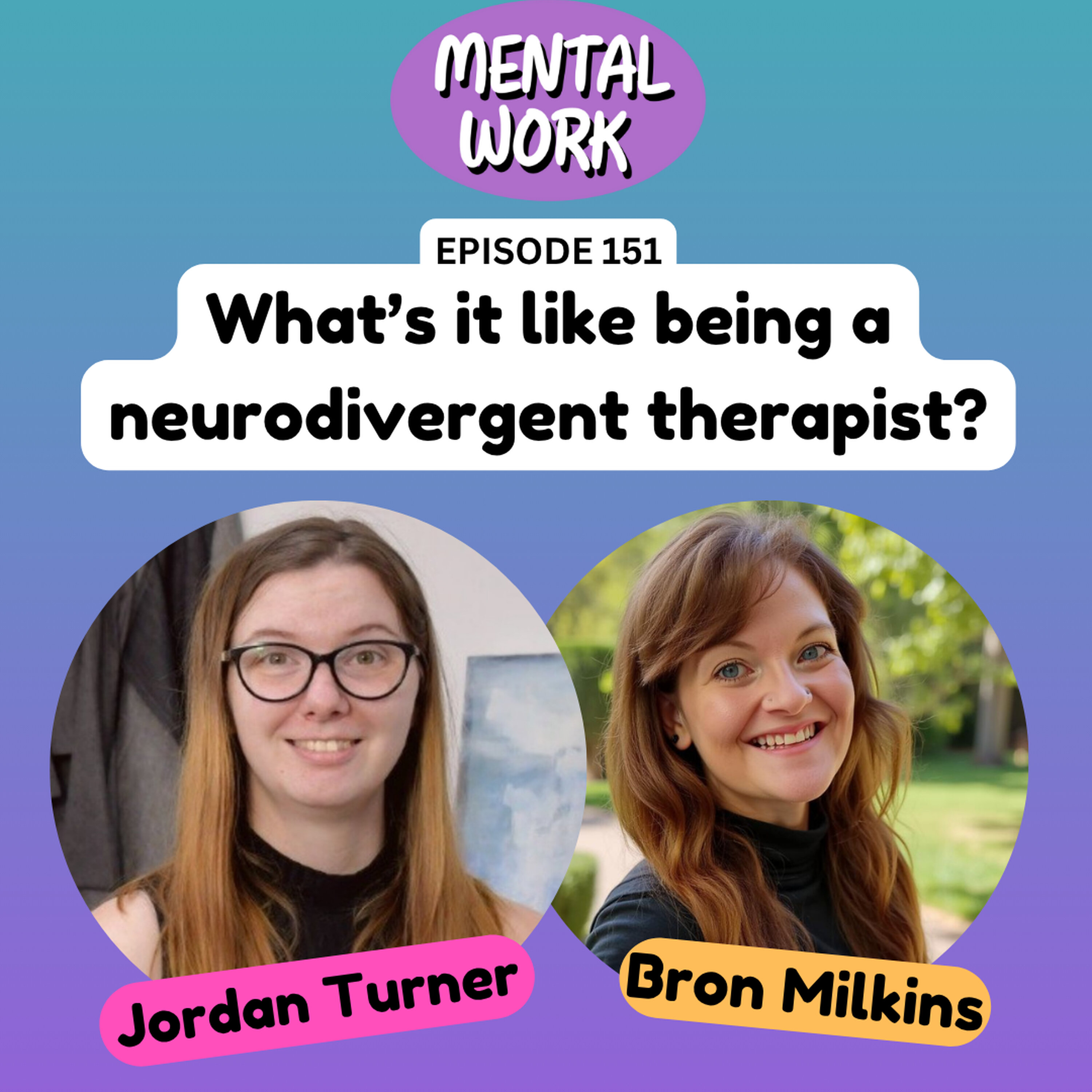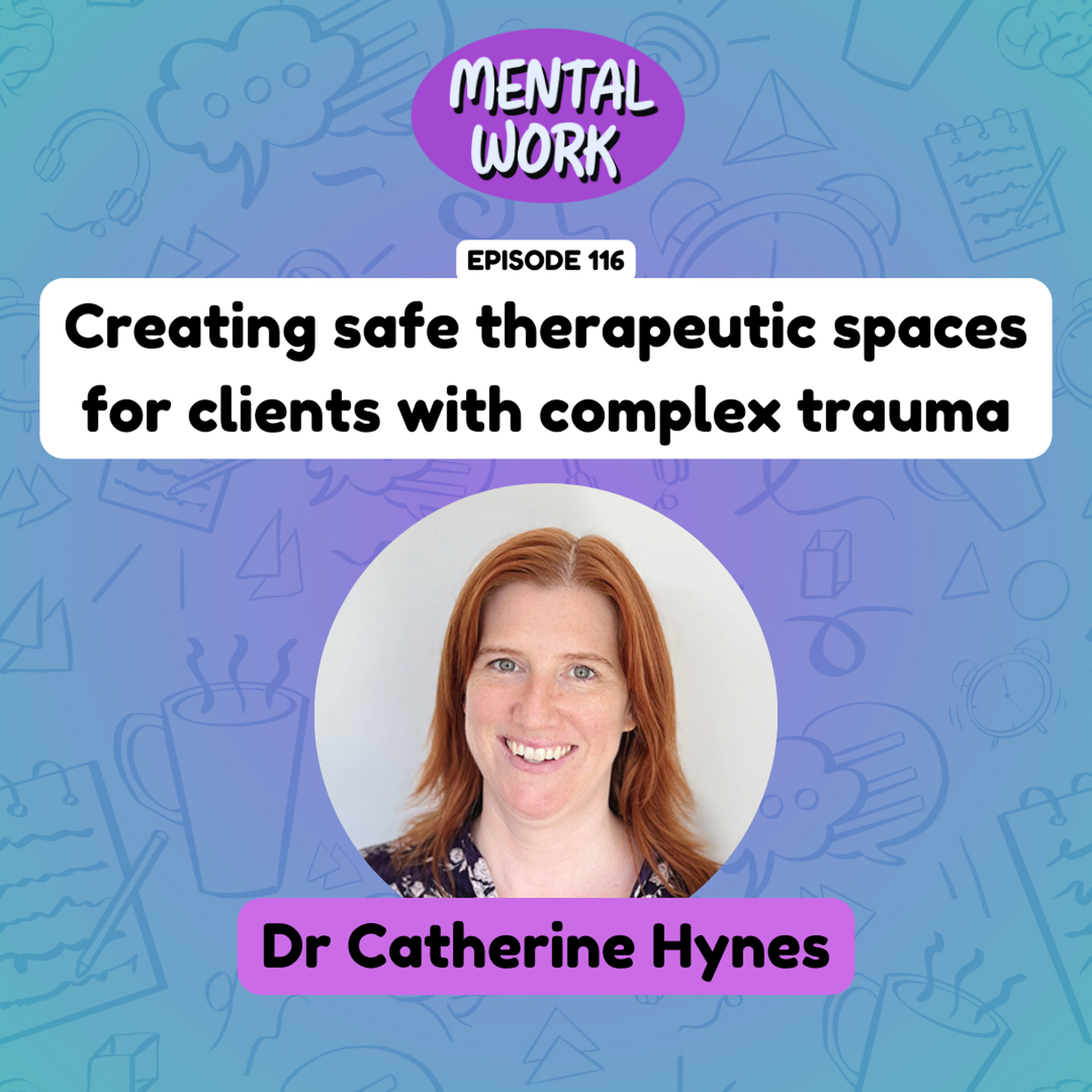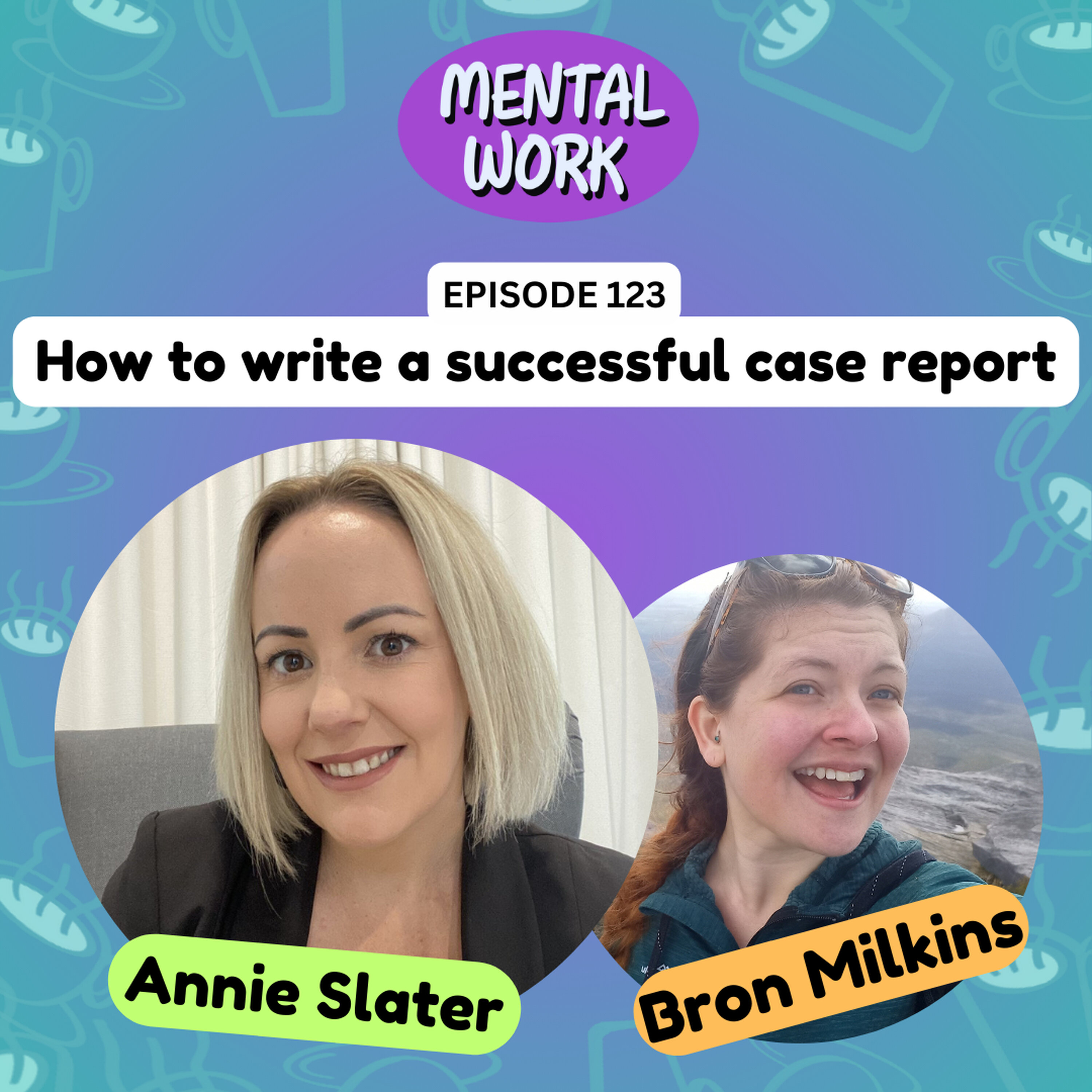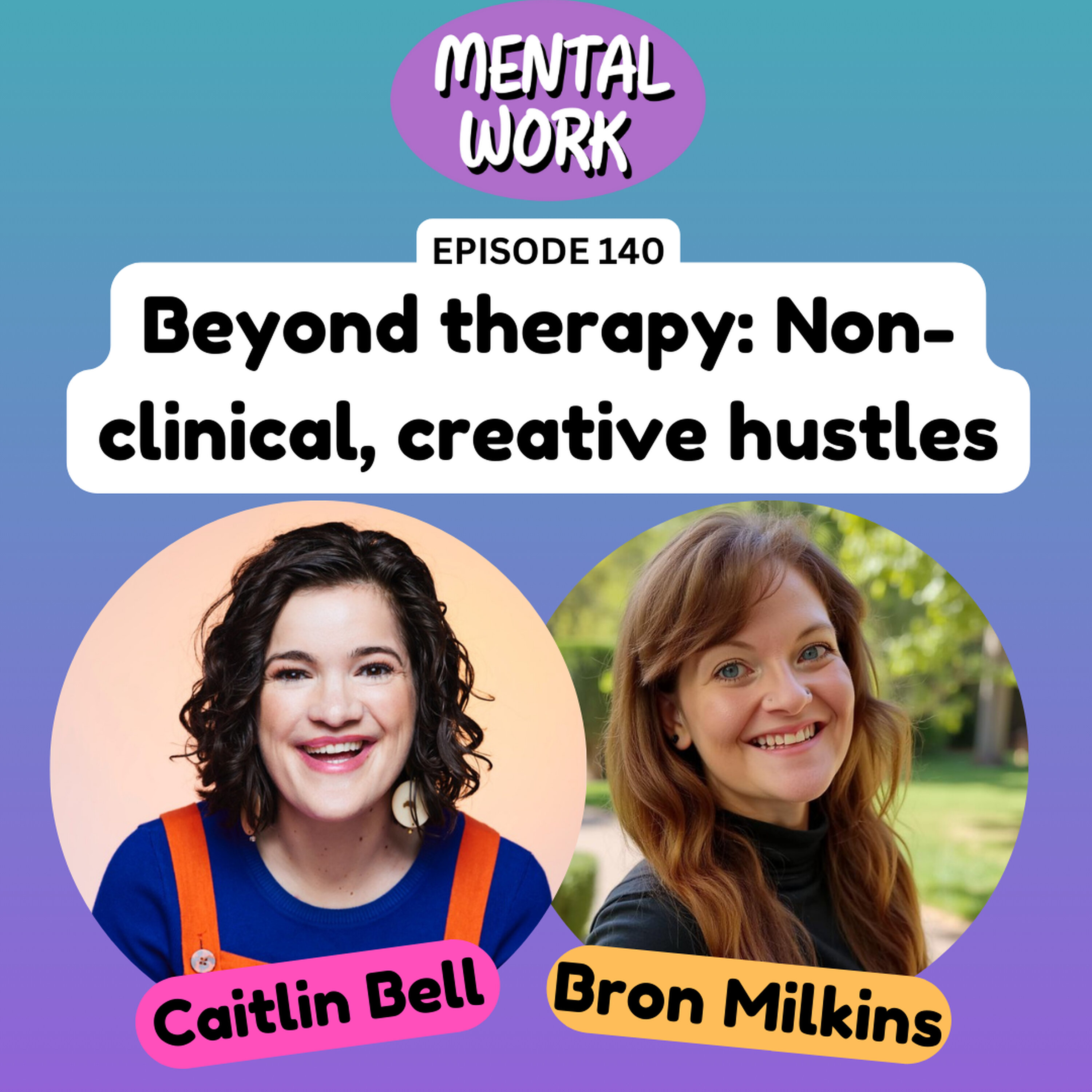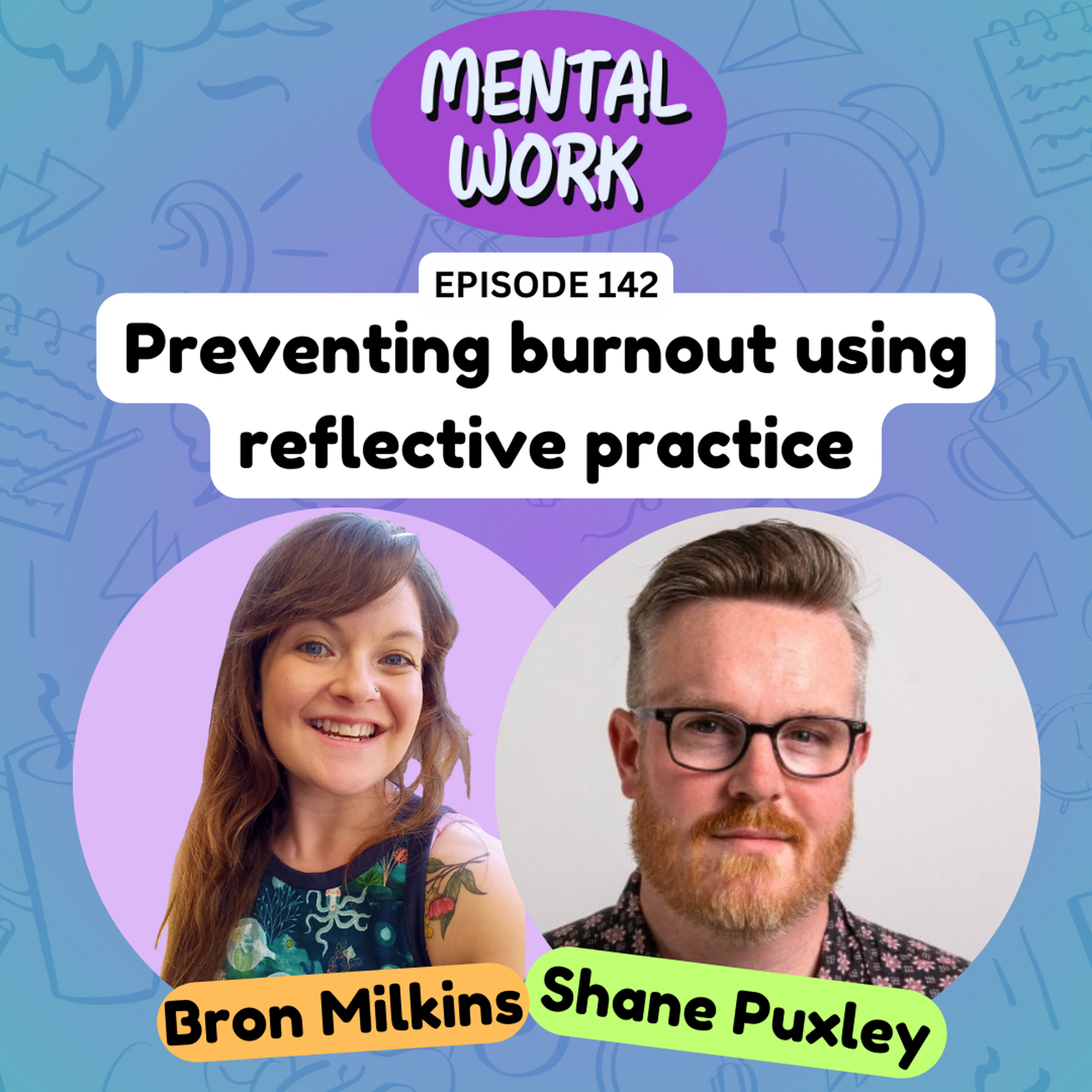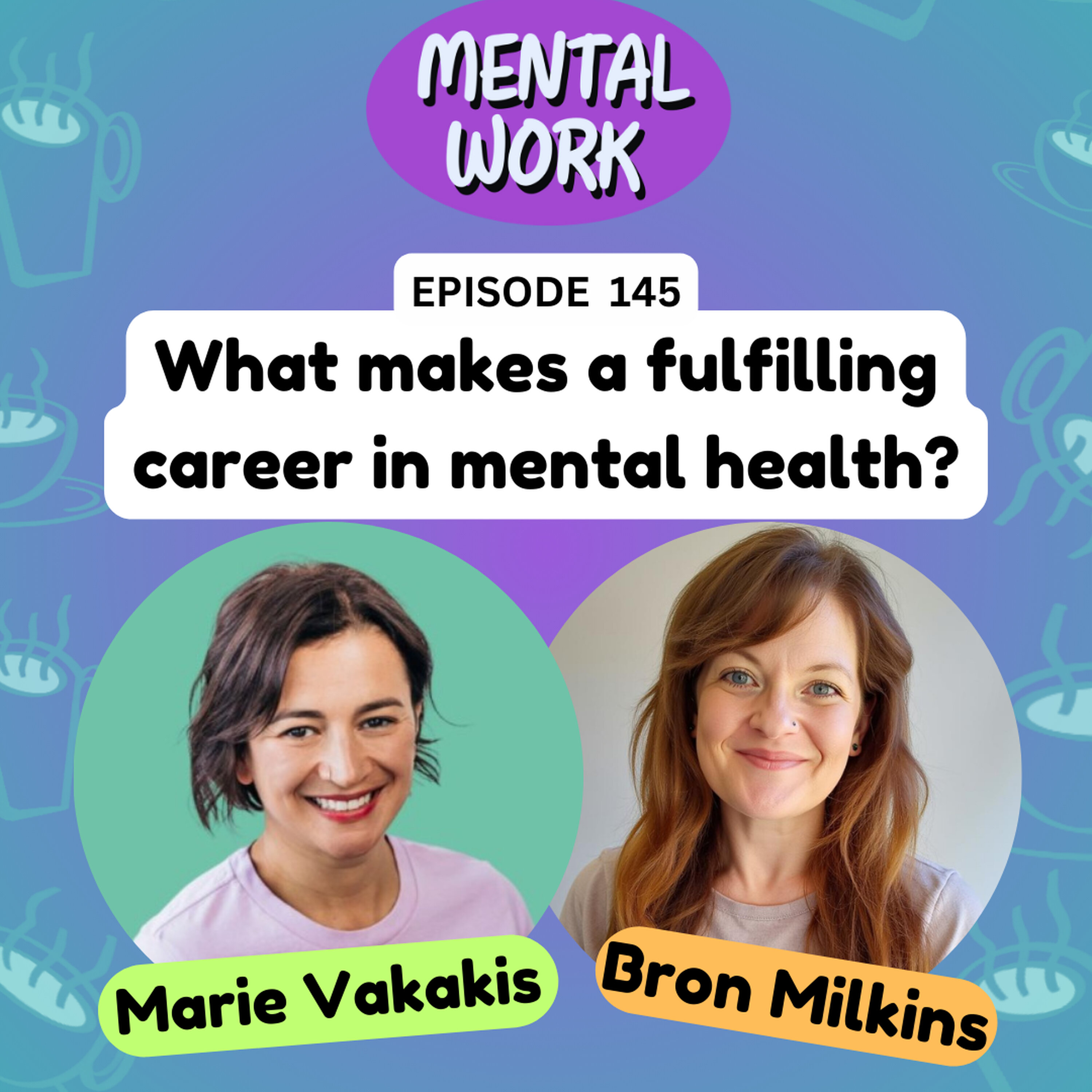Mistakes made and lessons learned

In line with Mental Work's aim to shine a light on the important yet under-discussed aspects of being an early-career psychologist, Bron shares the lessons she has learned from a complaint received two years ago. She outlines key knowledge gaps in the hopes that others can avoid her missteps, including understanding transference and countertransference, the impact of personal history and neurodivergence on practice, repairing ruptures, navigating complex ethical situations, and managing emotional dysregulation. Finally, she provides suggestions on how to increase knowledge in these areas, and highlights the need for collegiality amongst psychologists to promote a compassionate space for those still growing in their practice.
THE END BITS
Mental Work is your companion to early-career psychology, hosted by Dr Bronwyn Milkins.
Support the show by buying me a virtual coffee ☕
Sponsor the show for $2 a month on Patreon
Don't have cash to splash but want to support the pod? You can rate & review us on Apple and Spotify or share this episode with a mate.
Facebook / Instagram / YouTube (with captions & transcript) / Website / Apply to be a guest / Email Bron
CREDITS
Producer: Michael English
Music: Home
Disclaimer: The Mental Work podcast adheres to the APS Code of Ethics, the National Law, and relevant legislation. It provides informational and entertainment content. Content should not be considered a replacement for professional consultation or therapy. The Mental Work podcast is not a psychological service and being a listener or participant does not establish a therapeutic relationship. All views expressed are personal, subject to change, and do not represent those of any affiliated service or organisation. Efforts are made to ensure accuracy, but opinions may not always align with fact. Listeners are encouraged to thoughtfully assess the information presented and report any inaccuracies or concerns via email. Further information can be found here.
See omnystudio.com/listener for privacy information.
[00:00:00] Bron: Hey, mental workers, you're listening to the Mental Work podcast, your companion to early career psychology hosted by me, Dr. Bronwyn Milkins.
[00:00:12] Today's episode is a deeply personal one that I've been putting off recording for a while. I think it's really important to share with you though. So in 2022, I received a complaint. In Australia, this is an AHPRA notification and it took over one and a half years to be finalized. The impact of the complaint was enormous. I might do an episode later on the impacts professionally and personally, and what going through the experience was like, but for now I want to do an episode on something different because despite it being horrific, something good has come out of it and that's the amount of learning that has taken place.
[00:00:51] I honestly don't believe I would be at the same stage of professional development I am at now were it not for the complaint. So I'm not suggesting that you seek out a complaint, in fact please don't, but I wanted to share with you the gaps I had in my knowledge that led to the complaint and what I know now to help your growth and sustainability in your career in psychology and mental health. I also wanted to share it with you because I would love to open up a space for vulnerability and making mistakes as humans.
[00:01:20] In the situation that led to the complaint, I tried my best, but I made mistakes. I see on social media, and I've experienced directly in supervision, comments where people are very compassionate and they say, you tried your best, it's okay. But I also see and have heard comments like, that's unethical, that's reportable, that's unprofessional. And people say that knowing only one thing about the situation, or even when it's not actually unethical.
[00:01:49] What I'm asking for is a space to be imperfect and to receive kindness and compassion because I'm trying to be a therapist, but I'm also a human and I can't be perfect and I will make mistakes and I want to be able to learn from them and to be able to grow. But if we're constantly berating each other and pulling each other down, then we can't learn and we can't grow.
[00:02:13] So I hope you'll allow me this space today to be vulnerable and to share with you my mistakes so that you do not repeat them. Just for context, when I received the complaint, I was just under two years fully registered. So that means that I had gone through my provisional program, I was fully registered, but less than two years out. So still quite early career.
[00:02:36] Let's get started then, and I'm going to present it to you as the knowledge gap that I had and what I know now. And what I know now has been achieved through lots of supervision, lots of reading, I've read lots of chapters, books, I've done lots of training and professional development. I've also done a lot of personal reflection, which I think has helped. And I do want to point out that even though I know a lot more now than I did before, my knowledge is still in no way complete. There's much more to learn and the way that I'm going to frame what I know now, I'm sure someone with 20 years more experience than me could frame it much more eloquently.
Gap 1 - Transference and counter-transference
[00:03:18] Bron: The first knowledge gap that I had was only having a definitional understanding of transference and countertransference. My understanding of these two processes was that transference is the feelings that the client has and countertransference is the feelings that the therapist has in response to the client's feelings. That's it. That's all I knew. I knew these processes existed, that clients could have feelings, that therapists could have feelings.
[00:03:43] What I didn't know is that clients can have wishes or fantasies about the therapeutic relationship. They may want you, for example, to be their maternal figure. They may want you to be somebody who they can be angry at because they weren't able to express that anger to another person at another time. And I didn't know that clients could have these wishes for the therapeutic relationship and that I could be drawn into the wishes unwittingly due to my personal history or even stresses I was facing at the time.
[00:04:15] For example, if a client wanted you to be a maternal figure, I could be drawn into being that maternal figure and being like, "Oh, I'm so valuable to this client because I'm fulfilling this very important role that they did not have". And if you're aware of it, fantastic. You can potentially work with that kind of transference and work with the client's feelings there. But if you're not aware of it, therein lies the potential danger.
[00:04:38] What I know now is that transference and countertransference are dynamic processes where clients project feelings and fantasies onto the therapist, and therapists can unconsciously respond based on their own histories. Being aware of these processes now helps me to maintain professional boundaries and to use supervision to explore and manage these dynamics.
Gap 2 - Knowing your own stuff
[00:04:59] Bron: Knowledge gap number two, I only had a surface level understanding of how my personal history would affect how I show up in the therapy room. Like, I'm a person who loves animals, so I've always known that I'd probably be unable to work with people who abuse animals because I couldn't remain unbiased and I think my feelings would interfere with effective therapy. I didn't consider that unresolved feelings about a relationship 10 years ago could be activated in the therapeutic relationship. And I had no idea how I would recognize this activation and manage it. And that's just one example. There are a number of other unresolved personal history type things, which I was not aware of could show up in therapy. I was like, well, when I think about them, they're not too distressing, but what I know now is that even though they're not distressing, when I think about them, they can still be activated because they are unresolved.
[00:05:55] And we all have unresolved stuff, don't we? But we think like, you know, it's not a big deal and it might not be, but it can always be activated through the way that a client says a certain phrase or interacts in therapy. And it's really important for us to be deeply aware of our own stuff for that reason. I've learned to identify my own triggers and manage them through self reflection, supervision, and importantly, personal therapy.
Gap 3 - Understanding how your neurodiversity may show up
[00:06:22] Bron: . Knowledge gap number three, I didn't fully appreciate how my personality and neurodivergence would show up in the therapeutic relationship. For example, I'm a really highly trusting person to a fault. I'm very gullible, and I always assumed that others have the best of intentions. I also have ADHD, part of which includes impulsivity in thinking and action. Finally, I also have a profile of being a really quick learner. My processing speed is really fast. So combined this with impulsivity means that I don't consider alternatives unless I tell myself to slow down.
[00:07:00] I didn't think about how this might combine in therapy. What it could mean is that if a client says, for example, "I didn't do my homework because I was too busy", I would process that information really fast. And because I'm quite impulsive, I'd be like, "Oh, that's fine". And I might brush off a really important therapeutic interaction that warrants being slowed down and examined.
[00:07:23] The other way those things interact is that I tend to run away with concepts if I don't slow down and think about them. For example, when I learned about unconditional positive regard, I thought, easy, I already do this, because I already think the best of everyone. And I kind of ran away with it to the extreme. And I'm not saying don't have unconditional positive regard for clients. What I'm saying is that I need to be curious about clients behaviour and not jump to the first automatic interpretation that I have. What I know now then is that I really do need to slow the F down.
Gap 4 - Everything is data
[00:07:56] Bron: Knowledge gap number four. I was updating my formulations in light of new background and personal history information that I gained from clients. Like if clients presented with an anxiety disorder, but then disclosed a series of traumatic events, I might update the formulation to unresolved trauma manifesting in anxiety. So I was really good from an informational perspective. What I didn't do was update formulations in light of new relational information between the client and myself. I didn't consider it data.
[00:08:26] What I know now is that it is all data. Anytime a client comes late to a session, that's data. Anytime I suggest something and they say, no, that won't work for me. That's data. Anytime I do something in therapy and a client says, "Wow, that's so cool how you did that. I'm, I'm really in awe of it". That's data. And I realize now that I need to update my formulations in light of that really important data, which is moment by moment. And if I'm not sure of how to, update my formulation in light of that data, then I take that to supervision with someone more experienced who can help me interpret it, because at the time, not only did I not recognize it as data, but I had no idea what to do with it.
Gap 5 - Know how to repair ruptures
[00:09:08] Bron: Knowledge gap number five, I didn't know how to repair ruptures in the therapeutic relationship. So I was really afraid of clients experiencing dissatisfaction with me because I wouldn't know what to do with it. Which meant that I avoided setting limits other than at the start of therapy.
[00:09:23] This is a really key one, and I think a really huge knowledge gap of mine ,and I want to emphasize it because I think it's a really big knowledge gap for other people as well. The reason why I say that is because I don't think we're all dummies. But we just don't get taught. It's not in the curriculum. For me to learn more about repairing ruptures, I had to practice it in supervision, but to get professional development on it, the main professional development I could find was based in the US.
[00:09:50] What I know now is that identifying ruptures and repairing them is an essential part of building a strong therapeutic alliance. Acknowledging and addressing dissatisfaction openly can enhance trust and provide really valuable opportunities for growth and understanding within the therapeutic relationship. I also know now that it nips any issues in the bud. For example, if a client is having expectations of the therapist that they were supposed to, air quotes, "fix things" by session two, rather than brushing over or ignoring that expectation, addressing that early, nipping it in the bud, can really enhance therapy in the future.
Gap 6 - Actively maintaining boundaries
[00:10:30] Bron: Knowledge gap number six, I didn't know how to bring up behaviors that I felt uncomfortable with, which were not within the boundaries of a professional relationship. For example, clients asking me to social events, giving me lots of flattery or comments on my appearance. I either ignored them or dismiss them as things that didn't need to be addressed as therapy was otherwise going well. In my mind, I was thinking, look, therapy is going really well, the client's kicking goals. They're progressing really well. Why do I need to disrupt therapy with bringing attention to these comments, which, you know, aren't really doing anything? It doesn't really matter.
[00:11:03] What I know now is that all behaviors that are potentially indicating that the client has a misunderstanding of the professional boundaries of the therapeutic relationship need to be addressed to ensure that the relationship remains boundaried and safe for the client.
[00:11:18] And I think a related gap in my knowledge here was just those interpersonal processes for how to do this, because I think a fear that I had was that, well, if I bring this up, this might cause shame for the client. And it also relates to the gap in my personal history, because for me, and I wonder if this is for lots of people who have been socialized as women, we're taught to ignore comments that we feel uncomfortable with. And so I had to reflect on that and then also gain the interpersonal skills to be able to bring it up and address it with clients in therapy.
Gap 7 - Knowing how to priortise competing ethical principles
[00:11:48] Bron: Knowledge gap number seven I had an ethical decision making process. I knew that there was this five step one that I could follow and I was using it. But what I didn't know was how to prioritize competing ethical principles in complex ethical situations, and I didn't consider that what I might prioritize might be different to what our professional body wants us to prioritize.
[00:12:13] So what I know now is that if I'm unsure about which ethical principle I should prioritize in any given situation, then that's something to take to supervision so I can get an outsider perspective. Because my values and what I prioritize may be different to what other people prioritize.
Gap 8 - Giving proper closure
[00:12:33] Knowledge gap number eight. I understood that clients needed closure to the therapeutic relationship and I was providing this, but the knowledge gap was that I underestimated how much the therapeutic relationship would mean to some clients and I probably wasn't giving enough attention to helping them process that loss.
[00:12:51] Bron: I know now that it's really important to thoroughly appreciate how important therapeutic relationship is to some clients. The way that I do this is I ask them what feelings and thoughts are showing up as we approach the end of therapy. "Is it all right that I keep on asking you about this as we come closer to the end"? I may even say to some clients now, sometimes when therapy ends it can bring up unexpected feelings of loss. I wonder if this is happening for you. This will help to provide a smooth transition and really help process the loss if they bring up those feelings of loss.
Gap 9 - Managing dysregulation
[00:13:23] Bron: And finally, knowledge gap number nine. I didn't have a way for managing feelings if I became dysregulated in interactions with a client. And I mean really dysregulated. Like I could handle it if I felt mildly uncomfortable or if I noticed a bit of anxiety, but I didn't have a way of managing if I just became completely dysregulated or flooded. I guess I assumed that it wouldn't happen, or if it happened that, I don't know, I'd be able to deal with it. I just didn't really have a plan.
[00:13:49] I now have strategies in place to manage my own emotion regulation during client interactions when they're really stressful, such as mindfulness, grounding, and seeking immediate supervision or peer support when needed.
Recommendations
[00:14:01] Bron: And those were the main knowledge gaps that I had when I received a complaint. I think something to highlight is that they were mostly interpersonal knowledge gaps and intrapersonal... so knowing myself gaps.
[00:14:13] And when I think about why these were knowledge gaps, I don't think it's because of my conscientiousness. I'm a very detailed and thorough person. I would read everything on the reading list during uni, and I read everything on the national psychology exam curriculum. So I don't know whether other people were able to develop what I perceive as a hidden curriculum, and they were just able to have these knowledge gaps filled already, or maybe there was something different about me that meant that these were knowledge gaps.
[00:14:42] Either way, I hope that if you have identified that these are the same knowledge gaps for you, that you don't feel ashamed, but rather you make a plan to take small steps to bring them up in supervision or someone you trust to kind of get the ball rolling and make sure that they're addressed.
[00:14:56] I've got some other recommendations for you based on my situation. The whole situation with the complaint has made me realise how much we need each other. Like psychologists need other psychologists who they can trust and who can remain non judgmental for guidance and support. A key issue that I have had as an early career psychologist is finding people who are non judgmental and who can be supportive. I do have people who I can trust now but at the time I didn't. And I was relying on support over the internet, which just isn't enough. You can't discuss client cases in nuance and you can't discuss them fully.
[00:15:32] My recommendation is to meet with a peer group regularly, where you can spend at least 30 minutes just focused on you. If you do not have a case to present, don't say, I've got nothing. I want you to talk about your feelings in relation to your cases or your well being and how any current life stresses are showing up in your work, even hypothetically, and how you might manage that. There is always something to discuss, even if it's just how we're feeling on the inside.
[00:15:58] Another recommendation I have is to find a supervisor who you can trust and who fits for you. My situation with the complaint has made me firmly believe that supervision with a senior psychologist at least fortnightly and ideally weekly in the first two years post full registration is needed. And if you have had a harmful supervision experience and this is making it difficult to seek supervision or to use supervision fully, seek therapy to reprocess the trauma and advise your supervisor that you're doing this.
[00:16:26] Another thing is to go get therapy. Really important. And I want you to budget for it. I know it's expensive, but it's necessary. I haven't been able to afford therapy for the vast majority of my life. It is only now that I can afford it somewhat. It is so necessary though. And I don't know if this is controversial, but I don't think if you're seeking therapy, it should be CBT focused. I want it to be focused on going through your personal history and understanding what your triggers are, understanding who you are as a person, what your unresolved issues are, and your family dynamics and how they continue to influence how you show up as a person in your relationships and in therapy . I think this sort of therapy would be the most helpful for an early career psychologist.
[00:17:08] A thing that I do now that I wish I had done in the past is continuing to write reflections on my feelings and any way that I behave differently or were pulled towards or away from the client. I do that now for every client, even if it's just one sentence. I might be like, "Hmm, I actually felt like a bit more distant from the client this session". Or I might reflect and write down, "I felt a bit pulled to compliment the client more this session. Isn't that interesting"? What I then do is I highlight the reflections that I want to discuss more in supervision. And I found that this is really effective.
[00:17:42] I would really encourage you to practice identifying and repairing ruptures in the therapeutic relationship, but in role plays with your supervisor or your peers. I'll pop a link to some of the work that's been done in this space, particularly the work of researchers Muran and Eubanks is really fantastic.
Final thoughts
[00:17:58] Bron: And that's all I have to say on this subject where I talked about my gaps in knowledge that led to me receiving a complaint two years ago. Thanks for allowing me to have this space to be vulnerable and share it with you. I do truly hope that it's helpful either from you realizing that, "Hey, maybe I don't know much about this and I'm going to do some professional development therapy or supervision around it".
[00:18:21] Or from the other side of things, which is that I'm sharing it with you because I made mistakes because I'm a human. And maybe this gives you a bit of encouragement that you can be human too. I don't often hear about more serious mistakes that therapists have, and I'm still in the process of working out whether these mistakes reflect that there's something wrong with me, or whether they reflect that, look, there's just so much to learn in psychology and how could I have possibly been across it all.
[00:18:49] Through therapy, I am leaning towards the latter. I know that I try my best to be a good clinician. But I also just know that it's impossible to be perfect. So I hope that you can accept me and receive me with kindness and compassion. And if that's not possible, then it's been lovely to have you as a listener.
[00:19:07] Thanks for having me on this important episode and thanks for listening to the Mental Work Podcast. I hope you have a good one. Catch you next time, hopefully. And bye!




